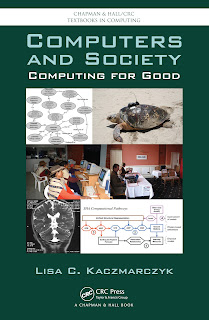On the computing education front: At the upcoming SIGCSE 2012 conference there will be sessions on studio based learning (several), digital humanities, interdisciplinary database applications, knitting patterns and program tracing, science fiction in computer science education. There will be presentations on healthcare and computing (several), and interdisciplinary travel. There will also be a special session devoted to the role of interdisciplinary computing in academia, research and industry. This session will be run by Ursula Wolz and Boots Cassel, the same people who organized the interdisciplinary computing meetings I attended and wrote about this past year. Interdisciplinary is becoming a hot topic in computing education.
In the private sector: Volumes of online and print text are dissecting everything that might have led to Steve Jobs repeated successes. Analyses of Jobs and the innovations he drove have repeated his comments about how Apple existed at the intersection of liberal arts and technology. A repercussion of these discussions is going to be (I predict) even greater corporate emphasis on how a meeting of minds between computing and traditionally non-technical fields can lead to innovation.
The term "social intelligence" is becoming more common as we look at what we can learn, intuit, predict, and know from analyzing social media. If we are to really understand what social media has to tell us about people, or, conversely, if we are to really use social media intelligently for business purposes (two sides of the same coin), we will have to do more to integrate our understandings from psychology, anthropology and sociology into our computing development work. There is huge potential here for intelligent forward thinking collaborations.
Most telling: If you pick up any computing / technology magazine off the supermarket rack and flip through it, you will find advertisements from organizations that tout their interdisciplinary or multidisciplinary achievements. Energy, water, biomedical, transportation, communication, disaster prediction and management, interactive literature.
One can focus on the exaggeration and hype inherent to much advertising, but that would be missing the bigger picture. The important thing to note is that the whole notion of promoting interdisciplinary computing has entered the mainstream. When large and small organizations jockey to convince potential customers and clients that *they* are on the forefront of interdisciplinary computing, then interdisciplinary computing is no longer on the fringe. Funding follows, and smart funding has the potential to nurture environments that drive technological innovation.
People will make the final decisions and determine the directions interdisciplinary computing takes. I am optimistic and excited about where we can go..
Happy Healthy Interdisciplinary New Year!
